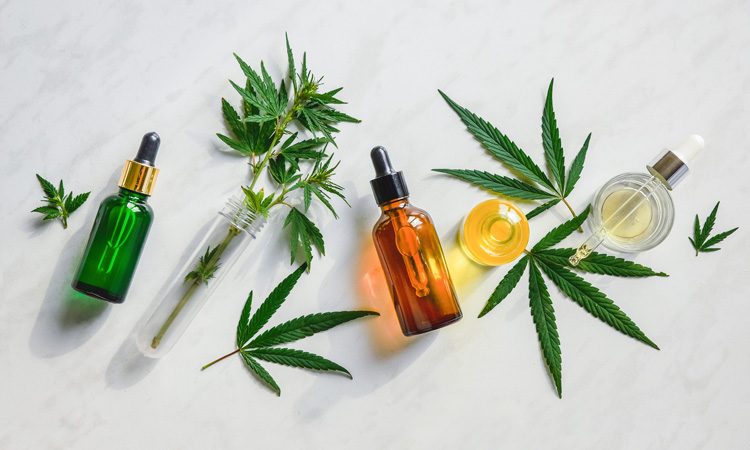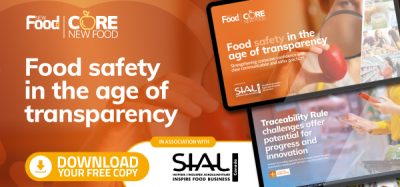The complexities of CBD
- Like
- Digg
- Del
- Tumblr
- VKontakte
- Buffer
- Love This
- Odnoklassniki
- Meneame
- Blogger
- Amazon
- Yahoo Mail
- Gmail
- AOL
- Newsvine
- HackerNews
- Evernote
- MySpace
- Mail.ru
- Viadeo
- Line
- Comments
- Yummly
- SMS
- Viber
- Telegram
- Subscribe
- Skype
- Facebook Messenger
- Kakao
- LiveJournal
- Yammer
- Edgar
- Fintel
- Mix
- Instapaper
- Copy Link
Posted: 26 September 2019 | Sam Mehmet (New Food) | No comments yet
New Food attended the TTS Pharma event, ‘CBD – The science behind purity’, to explore how cannabinoids are being manufactured and regulated for the food and beverage industry.


The rise of the complex position of cannabinoids in the food and beverage market was explored at the ‘CBD – the science behind purity’ event held at Royal College of GPs in London last week.
Led by Mark Tucker, CEO of TTS Pharma, the event focused on how the regulation and legislation of CBD is changing, and how the market is growing at a faster rate than the regulators can support.
CBD is not a controlled substance, but the manufacturing of cannabinoids requires a Controlled Drugs license to harvest, process or extract CBD to ensure the controlled drug elements of THC and CBN are safely removed.
Food supplements are driven by the European novel foods legislation, and there are currently no pre-market authorisations issued anywhere.
The session speakers explored how hemp, which is the Cannabis strain grown for industrial use, can legally be grown in the UK, ensuring the crop does not exceed 0.2 percent tetrahydrocannabidiol (THC). Tucker explained how, if these crops are harvested late in the season, THC levels can get as high as one percent, meaning the crop must be held back to allow the THC to deteriorate.
He outlined concerns over labelling, with some products on the market claiming to be ‘THC free’ but contain the THC degradation component, CBN, which is considered psychoactive and potentially dangerous to those operating machinery or driving.


‘CBD – The science behind purity,’ Royal college of GPs, London.
He added that some products do not correctly label the dose of CBD they contain either. CBD itself is nontoxic, but as it is derived from hemp – said to be one of the world’s best sponges for retaining pollution and toxins – there is a potential that it can carry carcinogens and mycotoxins which could eventually end up in the food chain.
According to the speakers, it is not a fixed single dose of these toxins that poses a danger, but an accumulative one. If these products are completely authorised and people are exposed to these toxins over a prolonged period of time, the health dangers will begin to rise. Some of these harmful metals are not excreted by the body, and can thus sit in tissue, which could cause serious downstream effects later in life.
Concerns over currently available products were evidenced in a recent independent study commissioned by TTS Pharma and conducted by Fera Science Ltd. The results confirmed the presence of controlled substances and harmful impurities as well as inaccurate labelling of CBD content in many of the 31 products tested.
“There is a call for this market to be completely deregulated and liberalised, but in reality, there is a significant amount of ongoing academic research and, over the next few years, it is likely to be published into the public domain. I am confident that we are going to see significant long term effects which are linked to these drug interactions because it is undoubtedly bioactive,” Tucker said.
New Food spoke to Dr Michele Sadler, PhD, BSc, Scientific Advisor to TTS Pharma, who are compiling their own Novel Food dossier, about how, despite these potential dangers and complex regulations, the food and beverage industry is still seeing the increasing popularity of CBD products.
Dr Sadler pointed out that although no health or medical claims can lawfully be made for CBD products, many consumers wish to try them, or view them as useful for a wide range of ailments.
She stated that a 2018 report by the World Health Organization (WHO) concluded that CBD is generally well tolerated and has a good safety profile. Research into the safety of CBD is ongoing, because this is required for a novel food application, but there is currently no common standard for testing CBD products.
Dr Sadler said: “The Food Standards Agency (FSA) has referred the safety of CBD to the Committee on Toxicity for review, and their report is awaited. A key issue is dose, as the amount tested in studies is invariably many times higher than would be ingested from a food supplement or food product. Demonstrating safety for consumers is the key purpose of the novel foods regulations.
“The challenge is getting the necessary research studies done to support novel food applications, and then obtaining the novel foods authorisation.
“A further challenge will be to demonstrate purported health benefits so that, in the future, claims might legally be made for CBD in order to sustain the market,” she added.
When does it stop being a food supplement and where does it start being a medicine?
These claims must, however, be refined. Tucker stressed that it is essential the market differentiates between food supplements and medicine, and that regulation must reflect this.
Related topics
CBD hemp & cannabis, Food Safety, Health & Nutrition, Mycotoxins, Regulation & Legislation, Research & development, The consumer









